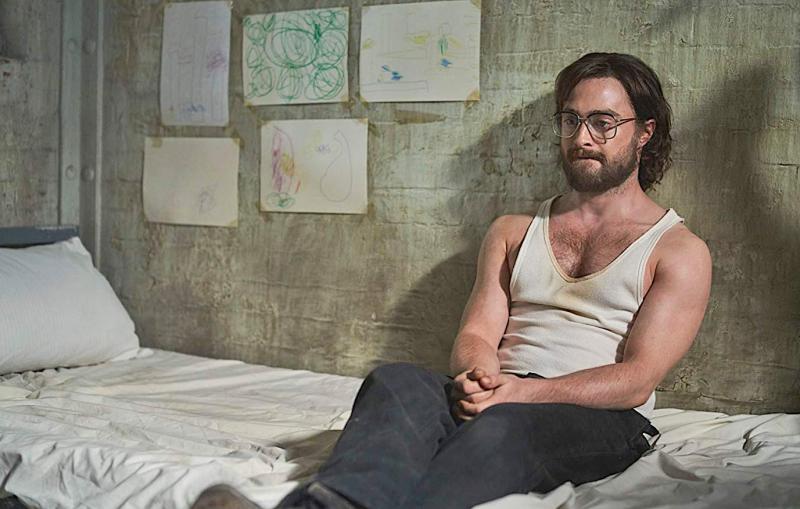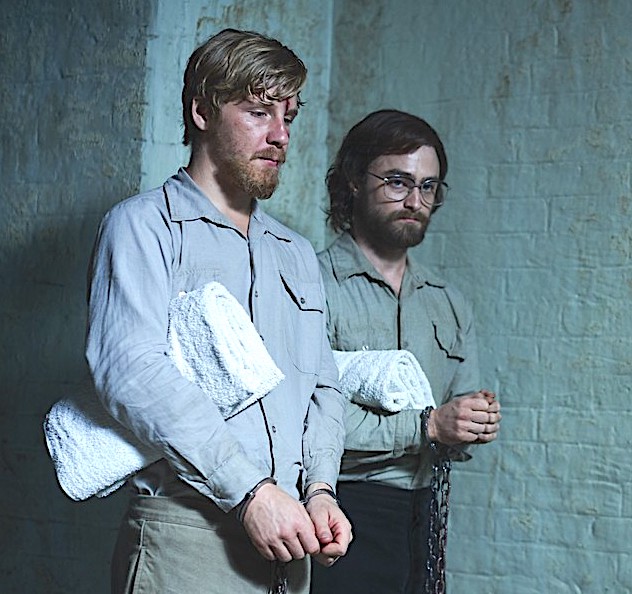Escape from Pretoria review - fun but facile prison-break drama | reviews, news & interviews
Escape from Pretoria review - fun but facile prison-break drama
Escape from Pretoria review - fun but facile prison-break drama
Lightweight treatment of a true story from the apartheid era

Based on the book by former political prisoner Tim Jenkin, Escape from Pretoria is an intermittently engaging jailbreak tale set in South Africa’s apartheid regime in the 1970s, as well as further evidence of Daniel Radcliffe’s determination to run as far as possible in the opposite direction from his past life as Harry Potter. Its only problem is a troubling case of schizophrenia, since it’s not sure whether to be a pared-down thriller or a political statement.
Radcliffe plays Jenkin, who with his fellow African National Congress-supporting comrade Stephen Lee (Daniel Webber) gets arrested for a comically inept stunt where the pair of them put exploding bundles of political leaflets in wastepaper bins. Apparently it didn’t even occur to them to run away after they’d done it, and within the twinkling of an eye the outraged judiciary had the pair despatched to Pretoria Central Prison (12 years for Jenkin, eight for Lee).
The prison is a hellhole of brutish warders, primitive cells and trigger-happy snipers patrolling the walls, but our protagonists are determined to break out. Although there’s an ANC prisoners’ council in the jail, run by another real-life character, Denis Goldberg (Ian Hart), they’re strangely negative about Jenkin’s plans and try to dissuade the pair from going ahead with it. They won’t listen though, and partnering up with the volatile Frenchman Leonard Fontaine (Mark Leonard Winter), they set about hatching a wildly improbable scheme (Radcliffe and Daniel Webber, pictured below).
 It involves making a set of keys to all the various doors they’ll need to open if they’re going to make their getaway. Since their resources are severely restricted, Jenkin settles on the idea of fabricating the keys from wood in the prison workshop.
It involves making a set of keys to all the various doors they’ll need to open if they’re going to make their getaway. Since their resources are severely restricted, Jenkin settles on the idea of fabricating the keys from wood in the prison workshop.
The core of the film is a claustrophobic account of how Jenkin studies the warders’ keys while the others distract their attention, then figures out various incredible methods of getting the keys into the appropriate locks while still inside his cell, using a mixture of home-made Meccano and a pulley system. This prompts various nile-biting moments as the escapees test out their plans in the middle of the night, narrowly evading prowling warders. The ever-suspicious guards keep searching their cells, but luckily manage to overlook telltale evidence when it’s staring them in the face.
Director Francis Annan uses archive footage to evoke the riots and brutality of apartheid, and period cars, posters and clothes wing us back Seventies-wards, but the fierce politics of the era are kept firmly in the background and are never fully addressed. The end result feels quaintly old-fashioned, like a World War Two prison camp movie. Meanwhile, the portrayal of the prison guards as shouty, incredibly thick caricatures makes the film resemble a spin-off from Ronnie Barker’s Porridge. And why can nobody do a plausible South African accent? It’s quite watchable, but it’s an odd mixture.
Add comment
The future of Arts Journalism
You can stop theartsdesk.com closing!
We urgently need financing to survive. Our fundraising drive has thus far raised £49,000 but we need to reach £100,000 or we will be forced to close. Please contribute here: https://gofund.me/c3f6033d
And if you can forward this information to anyone who might assist, we’d be grateful.

Subscribe to theartsdesk.com
Thank you for continuing to read our work on theartsdesk.com. For unlimited access to every article in its entirety, including our archive of more than 15,000 pieces, we're asking for £5 per month or £40 per year. We feel it's a very good deal, and hope you do too.
To take a subscription now simply click here.
And if you're looking for that extra gift for a friend or family member, why not treat them to a theartsdesk.com gift subscription?
more Film
 London Film Festival - from paranoia in Brazil and Iran, to light relief in New York and Tuscany
'Jay Kelly' disappoints, 'It Was Just an Accident' doesn't
London Film Festival - from paranoia in Brazil and Iran, to light relief in New York and Tuscany
'Jay Kelly' disappoints, 'It Was Just an Accident' doesn't
 Iron Ladies review - working-class heroines of the Miners' Strike
Documentary salutes the staunch women who fought Thatcher's pit closures
Iron Ladies review - working-class heroines of the Miners' Strike
Documentary salutes the staunch women who fought Thatcher's pit closures
 Blu-ray: The Man in the White Suit
Ealing Studios' prescient black comedy, as sharp as ever
Blu-ray: The Man in the White Suit
Ealing Studios' prescient black comedy, as sharp as ever
 The Woman in Cabin 10 review - Scandi noir meets Agatha Christie on a superyacht
Reason goes overboard on a seagoing mystery thriller
The Woman in Cabin 10 review - Scandi noir meets Agatha Christie on a superyacht
Reason goes overboard on a seagoing mystery thriller
 London Film Festival 2025 - crime, punishment, pop stars and shrinks
Daniel Craig investigates, Jodie Foster speaks French and Colin Farrell has a gambling habit
London Film Festival 2025 - crime, punishment, pop stars and shrinks
Daniel Craig investigates, Jodie Foster speaks French and Colin Farrell has a gambling habit
 I Swear review - taking stock of Tourette's
A sharp and moving tale of cuss-words and tics
I Swear review - taking stock of Tourette's
A sharp and moving tale of cuss-words and tics
 A House of Dynamite review - the final countdown
Kathryn Bigelow's cautionary tale sets the nuclear clock ticking again
A House of Dynamite review - the final countdown
Kathryn Bigelow's cautionary tale sets the nuclear clock ticking again
 theartsdesk Q&A: Idris Elba on playing a US President faced with a missile crisis in 'A House of Dynamite'
The star talks about Presidential decision-making when millions of lives are imperilled
theartsdesk Q&A: Idris Elba on playing a US President faced with a missile crisis in 'A House of Dynamite'
The star talks about Presidential decision-making when millions of lives are imperilled
 Urchin review - superb homeless drama
Frank Dillane gives a star-making turn in Harris Dickinson’s impressive directorial debut
Urchin review - superb homeless drama
Frank Dillane gives a star-making turn in Harris Dickinson’s impressive directorial debut
 Mr Blake at Your Service review - John Malkovich in unlikely role as an English butler
Weird comedy directed by novelist Gilles Legardinier
Mr Blake at Your Service review - John Malkovich in unlikely role as an English butler
Weird comedy directed by novelist Gilles Legardinier
 Don't Let's Go to the Dogs Tonight review - vivid adaptation of a memoir about a Rhodesian childhood
Embeth Davidtz delivers an impressive directing debut and an exceptional child star
Don't Let's Go to the Dogs Tonight review - vivid adaptation of a memoir about a Rhodesian childhood
Embeth Davidtz delivers an impressive directing debut and an exceptional child star

Comments
Just a poor movie, and the